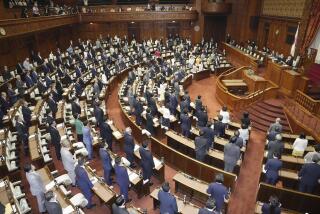Japan Lower House Passes Bill to Regulate Religions
- Share via
TOKYO — Overriding strong resistance from its main political opposition, Japan’s ruling coalition rammed a controversial bill tightening supervision of religious organizations through the lower house of Parliament on Monday.
The bill was initiated in response to a terror attack on the Tokyo subway system last spring, allegedly by the Aum Supreme Truth religious cult. It must still get through the legislature’s upper house.
Revision of the current 1951 Religious Corporations Law has turned into a high-stakes political battle, and passage of the bill is seen as a major victory for the three-party ruling coalition.
Under current law, religious organizations enjoy a host of protections. Their nonprofit activities are unmonitored and tax exempt, although their commercial endeavors are taxable and subject to government audits. There is no limit on--or monitoring of--how nonprofit money is used.
Critics charge that the ruling coalition’s real goal in revising the law is to cripple the opposition New Frontier Party, which enjoys strong support from the lay Buddhist organization Soka Gakkai.
The New Frontier Party strongly opposes the new law, which requires that religious organizations active in more than one prefecture be under the jurisdiction of the Education Ministry rather than local governments so that authorities can keep closer tabs on religious organizations from Tokyo.
Religious groups will be required to disclose detailed financial information. The government will have the right to demand documents on all members.
More to Read
Sign up for Essential California
The most important California stories and recommendations in your inbox every morning.
You may occasionally receive promotional content from the Los Angeles Times.













